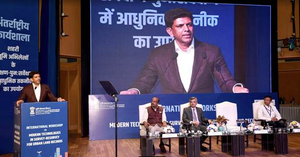India leading global south in offering climate solutions: UK High Commissioner
New Delhi, Oct 22 (IANS) Over the next decade, India can take a lead in developing low-cost green technology and transferring it for the benefit of the global south, said Lindy Cameron, the UK High Commissioner to India, on Tuesday.
Speaking at the NDTV World Summit 2024 session on ‘The Climate Agenda: Setting the Terms’, Cameron also expressed confidence that India would also set an example in low-cost and low-carbon growth relying on solar power.
“India has the scale, innovation, technology and the aspiration and the ability to create low-cost technology and export for the benefit of countries to the global south,” she said, expressing happiness that the UK is a part of the International Solar Alliance and is working closely with countries like India in this direction.
She also credited India for charting an “exciting” path of low-cost and low-carbon development. “There is an area where there is a lot of opportunity for private investment,” she said.
Promising better finance for the developing world in the coming years, the UK High Commissioner said, “Indian ambition for development should not be constrained by the responsibility of the planet.”
Harjeet Singh, Global Engagement Director, Fossil Fuel Non-Proliferation Treaty Initiative, highlighted the problems in financing climate change action in developing nations.
“As developed nations increase their spending to fight climate change on the domestic front, it may impact the flow of finance for the developing countries,” he said.
He highlighted the trust deficit between the developing nations and the developed nations on countering climate change.
“The trust deficit is there because the developed nations have not acted based on their historical responsibility and fair share while putting pressure on developing countries to do more without providing finance and technology,” he said, adding that this trust deficit is also the reason why some countries like India are feeling the pressure.
“If you look at the global fossil fuel expansion between now and 2050, about 50 per cent of the expansion is expected to come from five countries – Australia, Canada, Norway, the UK and the US,” he said, highlighting the legacy of the West of being the big polluters.
Erik Solheim, former Minister of Climate and the Environment of Norway, hailed the green strides made by Gujarat and setting an example of finding an “enormous opportunity” in climate change.
“If India replaces oil and gas with solar energy, it saves money, which it can use for health and education,” he said.
He said that Gujarat has a target of 100 GW of solar power by 2030 and seizing the opportunity for prosperity, for jobs, for income growth and for driving the state’s development.
Solheim cautioned decision-makers not to expect climate change to come from multilateral bodies but to promote individual efforts in countries like India, China, Brazil and Indonesia.
Shishir Priyadarshi, President of Chintan Research Foundation, agreed with the panellists that developing nations can’t have the same finishing line in terms of climate change efforts if they don’t have the same starting line in terms of climate damage.
Calling for a change in the narrative on what the Global South is doing on climate change, he said, “Climate agenda need not be dictated by the West to the developing nations.”
“The developing nations are going to drive down the highway for fighting climate change, but they are going to do this at their own speed; you don’t tell them where the pit stops should be,” he said.
–IANS
rch/sd



